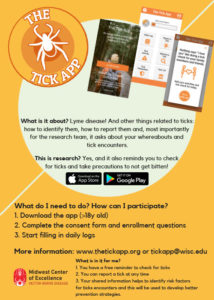By Bieneke Bron, Midwest Center of Excellence for Vector-Borne Diseases, UW-Madison
Do you ever wonder why you are always finding ticks on yourself or around you, but your friends never do? Researchers at the University of Wisconsin – Madison have developed a mobile application that allows users to share their experiences with ticks to help prevent future tick bites.

After an initial 5-minute survey to gather information about a user’s environment, Tick App participants are encouraged to tell researchers about their daily activities and tick encounters (or lack thereof) during peak tick season in the “Daily Log” feature of the app. When you start your logs during the peak tick season, you can get daily reminders, so you remember to check for ticks and tell the researchers about your outdoor activities.
If someone does encounter a tick, the app has a “Report-A-Tick” function where users can share information about where the tick was found, on whom it was found, and what kind of tick they think it is. They also have the ability to send in a photo of the tick to receive an expert opinion (or confirmation) on what tick species it is.
Along with the features mentioned above, the Tick App also provides individuals with information about how to identify different kinds of ticks, good ways to prevent tick exposure, and facts about ticks and the diseases they transmit. The Tick Activity function provides information on the local activity level of blacklegged ticks (also known as deer ticks) throughout the year.
So, ready to help scientists figure out why some people seem to pick up more ticks than others? You can download the mobile application by searching “The Tick App” in both the Google Play or App Store. The Tick App is compatible with a variety of devices and can be joined online through your web browser too.
Explore our websites www.thetickapp.org and www.mcevbd.wisc.edu. Questions about the Tick App can be directed to the UW-Madison Research team in the Midwest Center of Excellence for Vector-Borne Diseases through tickapp@wisc.edu or 608-265-4741.
